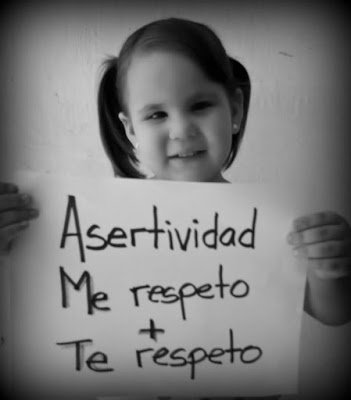How to teach our children from small to be ASSERTIVES? ***
Hello, happy day for everyone! ❇️
Today I want to share with you a very important topic that is part of the social skills of the human being, the "Assertiveness".
But what is Assertiveness?
It is a skill that is related to the self-esteem of the individual, and it is about being able to express our desires, thoughts and feelings in an empathic and respectful way towards the rest. And I want to emphasize, in the fact that it is not an inheritable characteristic, but on the contrary we can acquire it and develop it. In the case of our children it is very important that from a young age it is reinforced by parents and teachers.
What to do then to develop this skill in our children?
The learning that the child has depends in large part on us, his teachers and other adults with whom he interacts: family, school and society; Assertiveness will be a tool that will protect the child for life
El️ Learning patterns during the first seven (07) years of life in children determines many reactions and emotions that we will experience as adults in the circumstances we live. The problems to relate that we face in adulthood date from these early years, hence the importance of educating our children from small to be assertive people, to identify, value and respect their feelings as well as those of others.

Since we were little we tried to mold the children so that they think and act like us. The family nucleus feeds the family dependence and the need for approval. We see that even in something as simple as choosing clothes, the 6-year-old boy, for example, waits for Mom's decision, and although it seems an insignificant act, the truth is symbolic, although the child can receive guidance from his parents, which often receives is an imposition of their taste over the inclination of the child. It is important, that the child can express in a respectful way, choosing the best words, in a clear and honest way his taste, and not act to please others at the expense of their own desires.
At school, on the other hand, we see how the educational system disconnects the child's abilities, talents and potentialities, because it is a standardized system, which teaches everyone equally, and does not take into account the potential of each child and talents, not It strengthens self-esteem and on the contrary, promotes judgment and competition between them. The child does not receive the freedom to express their tastes and desires, but they are often coerced, to be imposed by the teacher who follows a project or a work program, and it is not that he expressly criticizes this method of work, but If I believe that it is time for us to become aware, question, analyze and motivate the revision of these methods that in this era were left behind, and we have seen the result of their application in society.
❇️❇️❇️❇️❇️
It is vital that parents, who have already become aware of the situation described above, are participants in the child's interaction with the teacher and vice versa, as well as classmates, as they are protagonists together with this of their performance and to act in school, and to help teachers in their work, since they often do not have the necessary tools or drag beliefs systems that are obsolete, fostering fear and punishments, which in the short term work but in the long term they can cause depressive processes or low self-esteem in children. Remember that it is about children being able to express themselves without attacking, or learning that they are not victims or aggressors.
❇️❇️❇️❇️❇️
Being assertive minimizes being a victim of Bullying:
An assertive child will respect himself, is aware of his rights and that of others. That is why parents, you have known your child the rights that he has as an individual and in the interaction with others. That they know how to say "no" when they feel it, avoiding abusive children and adults and not being victims of continuous ridicule and abuse by others (high self-esteem), or whether they apply it to other classmates (practitioners of empathy).
Finally I will mention several tips that I could summarize after reading several authors who have written on this subject, I will share the conclusions that I could reach:
How to teach assertiveness to children?
En️ Teaching them from a young age that we have no more right but the same right of others. Start with expressing them out loud, never think that he does not listen to you, maybe not his conscious but I assure you that his subconscious will arrive. At this point, you can use techniques such as programming the subconscious, when the child goes to sleep or when he is waking up, he will be in the alpha state, and everything you say will be recorded in the subconscious more quickly, here Take advantage, and say phrases that reinforce the above.
❇️Teaching them to answer Who they are? How much are they worth? Promote their self-knowledge, help them to name what they feel, their desires, encourage them to talk with you, how? Well, doing what you did before, talk about yourself, express yourself and then motivate them to do the same.
❇ Work to help build a stronger self-esteem with the child: talents and ideas,
❇ Use positive reinforcers or rewards after a behavior, any pleasant response that shows the child that the behavior you just showed is desirable. Reinforcements will increase the likelihood that the child will repeat the behavior again.
E Avoid the punishments, because in the short term they can give you results, but in the long term it can affect the confidence and self-esteem of the child.
❇️Educate with model or imitation, show the behavior you want to see in your child, this is one of the most effective ways to teach.
❇️Be reasonable in what you expect depending on the age of the child and what you teach, not require the child things for which it is not yet prepared, each child has its own rhythm.
❇️ Listen to your child attentively and without interruption, it will allow you to appreciate the dialogue of the child, and identify any abnormal situation.
❇️ Use role-playing to show behavior alternatives to the child in certain situations that enhance assertiveness.
Tra️ Try, as far as possible, not to use generalizations, as they close the dialogue, or hinder conversations that lead to change and understanding.
Pract️ Practice nonviolent communication, and in this way you will be teaching your child how to express themselves, here I share a link to one of my post that will help you learn more about this effective communication techniques https: // steemit. com / cervantes / @ annaycris09 / improvement-the-communication-with-your-partner-through-the-communication-non-violence-based-on-the-book-del-dr-marshal-rosemberg-4d569f8b641cc .
I hope this information is useful and motivates you to investigate more, and help your children to develop this tool that will be useful for their entire lives.
Source of images 1, 2, 3 and 4:
http://www.panorama.com.ve/pitoquito/Psicologa-presenta-5-derechos-asertivos-para-los-ninos-20160524-0042.html, https://www.guiainfantil.com/articulos/educacion/aprendizaje/4-juegos-para-practicar-la-asertividad-con-los-ninos/ y https://luisynciarte.com/2013/06/22/ni-agresivo-ni-sumiso-asertivo/.
Comment and upvote, let's form our support network for writers of this type of content, hugs.



@annaycris09

SEND Between 0.1SBD and 1SBD with your post in the memo to receive reesteem + impulse, you will receive guaranteed minimun 1x of what you send + reesteem to +3500 users.
Your publication has been successfully shared, with more than 2647 Steemit users thank you for participating in the last edition of free reestem.
If you find my project useful, donate a vote to my comment
This post has been shared by @andrea97